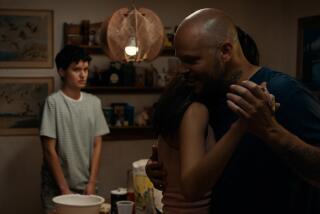MOVIE REVIEW : ‘Belle Epoque’: A Beautiful Interlude in Turbulent Times
Fernando Trueba’s sexy, bittersweet and contemplative comedy, “Belle Epoque” (at the Royal and Esquire), takes us back in time and place to an uncertain but hopeful moment of calm before the storm.
It’s February, 1931, somewhere in Spain. The previous December, there was an uprising in Madrid against King Alfonso XIII, who would soon leave the country, paving the way for the Republicans to gain control of the government by the end of the year.
Trueba and his co-writers imagine a magical interlude in a sunny idyllic setting, where freedom and passion reign. He views the workings of the human comedy with the wisdom and detached compassion of Jean Renoir, to whom the Oscar-nominated “Belle Epoque,” could stand as a homage.
Fleeing Madrid for the countryside and dreaming vaguely of emigrating to America, Fernando (Jorge Sanz), a handsome young army deserter, lands in a charming rural community after a darkly comic--and ultimately prophetic--encounter with a pair of Civil Guards. In the parlor of the local brothel, where the leaders of tiny Arcos, including the priest, regularly play cards, Fernando is taken under the wing of the leading member of the landed gentry, the aging but vital Don Manolo (the great veteran character star Fernando Fernan Gomez).
Don Manolo lives alone in his fine old manor house, and takes a paternal interest in Fernando. Several days later, Fernando has said his farewells, when suddenly the Don’s four attractive daughters descend upon their father. The bowled-over Fernando, not surprisingly, manages to miss his train.
In good time he manages to have his way with them--and vice versa. There’s Clara (Miriam Diaz-Aroca), a man-hungry recent widow; the gorgeous Rocio (Maribel Verdu), clumsily, presumptuously pursued by a rich nerd (Gabino Diego) and his titanically overbearing mother (veteran comedian Chus Lampreave); the pig-tailed, virginal Luz (Penelope Cruz) and Violeta (Ariadna Gil), a lesbian who finds herself attracted to Fernando once she’s got herself in a military uniform and him dressed as a maid, costumed for a carnival celebration. Fresh from the seminary, Fernando, who is initially naive and even prim, finds himself the sole male in a rural “La Ronde.”
Trueba looks beyond these lusty, comic and uninhibited couplings to envision a world where reigns a pagan freedom of spirit, epitomized by the open-minded, uninhibited Don Manolo, grateful for the hugely theatrical arrival of his opera-singer wife (Mary Carmen Ramirez), accompanied by her rich, devoted manager/lover (France’s peerless comedian Michel Galabru). Rebel at heart that he is, Manolo curses the fact that he’s potent only with his indomitable wife, who’s constantly sailing off to one disastrous concert tour after another.
Trueba casts us into a ribald “You Can’t Take It With You,” but subtly reminds us that like life, liberty itself can be fleeting. Trueba’s people, meanwhile, are too joyously partaking of life, speaking as freely as they make love, to realize how special this interlude is in which for once life pretty much proceeds the way it ought to.
Even though Spanish audiences are unquestionably at an advantage in regard to the film’s political context and its literary allusions, “Belle Epoque” surely possesses a warm, universal appeal. Trueba embraces his cast so affectionately that in spirit the sly, confident veterans Gomez, Ramirez and Galabru are as youthful as the cast’s good-looking and talented young actors. With its gorgeous settings, whimsical score and robust yet dark-tinged good humor, “Belle Epoque” is sure to be a strong contender for best foreign film.
‘Belle Epoque’
Fernando Fernan Gomez: Don Manolo
Jorge Sanz: Fernando
Maribel Verdu: Rocio
Ariadna Gil: Violeta
Miriam Diaz-Aroca: Clara
Penelope Cruz: Luz
A Sony Pictures Classics release of a co-production of Fernando Trueba (Madrid), Lola Films (Barcelona), Animatografo (Lisbon), French Production (Paris) with the cooperation of Sogepaq & Eurimages. Director Fernando Trueba. Screenplay Rafael Azcona; story by Azcona, Jose Luis Garcia Sanchez & Trueba. Line producer Cristina Huete. Executive producer Andres Vicente Gomez. Cinematographer Jose Luis Alcaine. Editor Carmen Frias. Costumes Lala Huete. Music Antoine Duhamel. Art director Juan Botella. Sound Georges Prat. In Spanish, with English subtitles. Running time: 1 hour, 48 minutes.
MPAA rating: R, for sexuality and language. Times guidelines: considerable nudity and sexual situations, and adult themes.
More to Read
Only good movies
Get the Indie Focus newsletter, Mark Olsen's weekly guide to the world of cinema.
You may occasionally receive promotional content from the Los Angeles Times.










